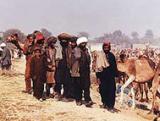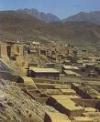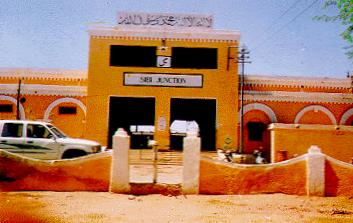 Origin
OriginSibi district was established in October 1903 then covering the present districts of Sibi, Ziarat, Dera Bugti, Kohlu, and Nasirabad.
Namehistory of sibi
The district is named after its headquarters, the town of Sibi, which in its turn derives its name from Siwi, a Hindu lady of Sewa race who is said to have ruled over this part of the country in former times.
Boundaries
The district borders on Ziarat district in the north, and in the north east on Loralai district. In the east and south east it borders on Kohlu district. To the south and south west lies Bolan district and in the north west it borders on Mastung district and Quetta district.
History of Colonial Administration
The British colonial influence started extending to Sibi region in the late forties of the 19th century, when in 1839, Misri Khan, the head of Panri tribe, tendered his services to Shah Shuja, and was taken into British service with a number of his followers, who were styled the "Baloch Levy. Subsequent events are a story of long and intense tribal wars that paved the way for ultimate annexation of the Sibi region to the British colonial empire. An entertaining account of the political events after Misri Khan's induction into British service is given in an old (undated) Gazetteer of Sibi; of which relevant excerpts are presented below:
"In March 1841, Mr. Ross Bell, the Political Agent in upper Sind, deputed one of his assistants with a detachment of troops, under the command of Colonel Wilson of the Bombay Cavalry, to collect the arrears of revenue due from Khajaks of Sibi on behalf of Shah Shuja. The detachment was accompanied by Misri Khan, and on the Khajaks refusing to comply with the demands, attacked the town, but were repulsed with heavy loss....... Reinforcements from Bagh were sent up under General Brooks. But before they could arrive the Khajaks abandoned their town, the defence of which were then demolished. The Khajaks were permitted to return during the following year and the town was rebuilt. From November 1841 to September 1842 an Assistant Political officer, resided at Sibi. When the British troops were withdrawn from Afghanistan on the termination of the war, the district was handed over by the British to the Khan of Kalat, but it does not appear to have been occupied by him, and in 1843 again came under the Baruzai rule ----. up to the second Afghan war Sibi continued to be held by the Baruzai chiefs as governors of the Afghan rulers; but owing to the constant raids and encroachments of the Marris, the country was, at the request of the Sardars and people, occupied at the commencement of the war by a detachment of troops from Jacobabad...... In November 1887 the Kach-Kowas and Harnai valleys, Sibi, Duki and Thal-Chotiali were declared parts of British India...... Owing to the disputes between the Zarkuns and the Marris, Kohlu was brought under the British protection and added to the Thal-Chotiali district in 1892. In February 1891 Sanjawi was again transferred to Thal-Chotiali, and Barkhan was added in April 1892. On reconstruction of the district in October 1903, the Barkhan, Duki and Sajawi tehsils were transferred to the new Loralai district, and the name of the Thal-Chotiali district was changed into that of Sibi district."
Post-Independence Period
The district underwent reorganization in the post-independence period to create Nasirabad division, Dera Bugti district, Kohlu district and Ziarat district. Following the post-1947 administrative re-organisation, the district's territorial jurisdiction has shrunk from 11,390 sq. miles as it was in 1903, to 7.796 sq. miles. The old description of it being a district covering vast and varied climatological zones, as it once was, is no longer true.
Sibi Travel Information
Sibi is a small town in the present western Balochistan province of Pakistan. It was once the head quarter of Sewistan province of Sindh kingdome and was named after the hindu tribe Sewa which inhabited here before 1880 when British laid out plans for the Railways and made Sibbi an important post of theirs. British named the new town as Sandemandabad after Sir Robert Sandeman popular british officer who ruled Dera Ghazi Khan and had organized pacts with Khan of Kalat to establish ties with Balouch chiefs of tribes.
Sibi has been a meeting point for Balouch chiefs and public since centuries, even today every 4th & 5th of February a Horse & cattle show is organised which is in continuation of the ancient annual meeting of all the chiefs of Balouchistan. The Horse & Cattle show is a great occasion to see Balouch people and the herds and know the culture of Balouchistan.
Sibi is also an interesting spot if you are driving from Quetta to Sukkur or vice versa
|   |
We offer special Excursions to Sibi from Quetta as well as from Sukkur please contact us for more details.

History of Sibi
The history of the town goes back to 13th century and due to its exposed position between the mouths of the Harnai and Bolan passes it had suffered frequent assaults and sieges - including one by the British in 1841. During British rule the town became an important junction on the Sind-Peshin railway where the Harnai line and the Quetta loop line meet, near the entrance of the Bolan Pass, 88 m southeast of Quetta. According to the 1901 census of India the population of Sibi was 4551. In 1903 the Victoria Memorial Hall was built from public funds, a piped water supply to the town was provided by military funds from the river Nari at a cost of Rs.115,000.
Sibi is a historical city of Balochistan. It is sometimes also known as Sivi[citation needed], purportedly named for a Hindu princess. Most of its population belong to Panni Pashtuns, Panni is the branch of Ghourghust and brother of a famous Pashtun tribe Kakar. Sibi is an agricultural city. Pashtoons (Panni) are the owner of 98% of landmass, while 2% land is owned by Balochs. There is also a historical fort in Sibi. This fort was built in the period on Hindu Rule and still exist in a bad condition
Tours of Sibbi
Sibbi is visited as a stop over during the journey from Sukkur to Quetta The imortant place to visit is the Sibbi Museum and the little bazaar in the city. One can also have an excursion of Sibbi either from Quetta or Sukkur.
Important Places/Buildings
Important places/buildings are:
- Fort Mir Chakar Khan.
- Victoria Hall built in 1903; now named Jirga Hall.
- Nari Gauge; from where the Nari canal takes off.
- Sohbat Sarai (Inn).
- Sibi Stadium, the venue of the famous Sibi week.














0 comments:
Post a Comment